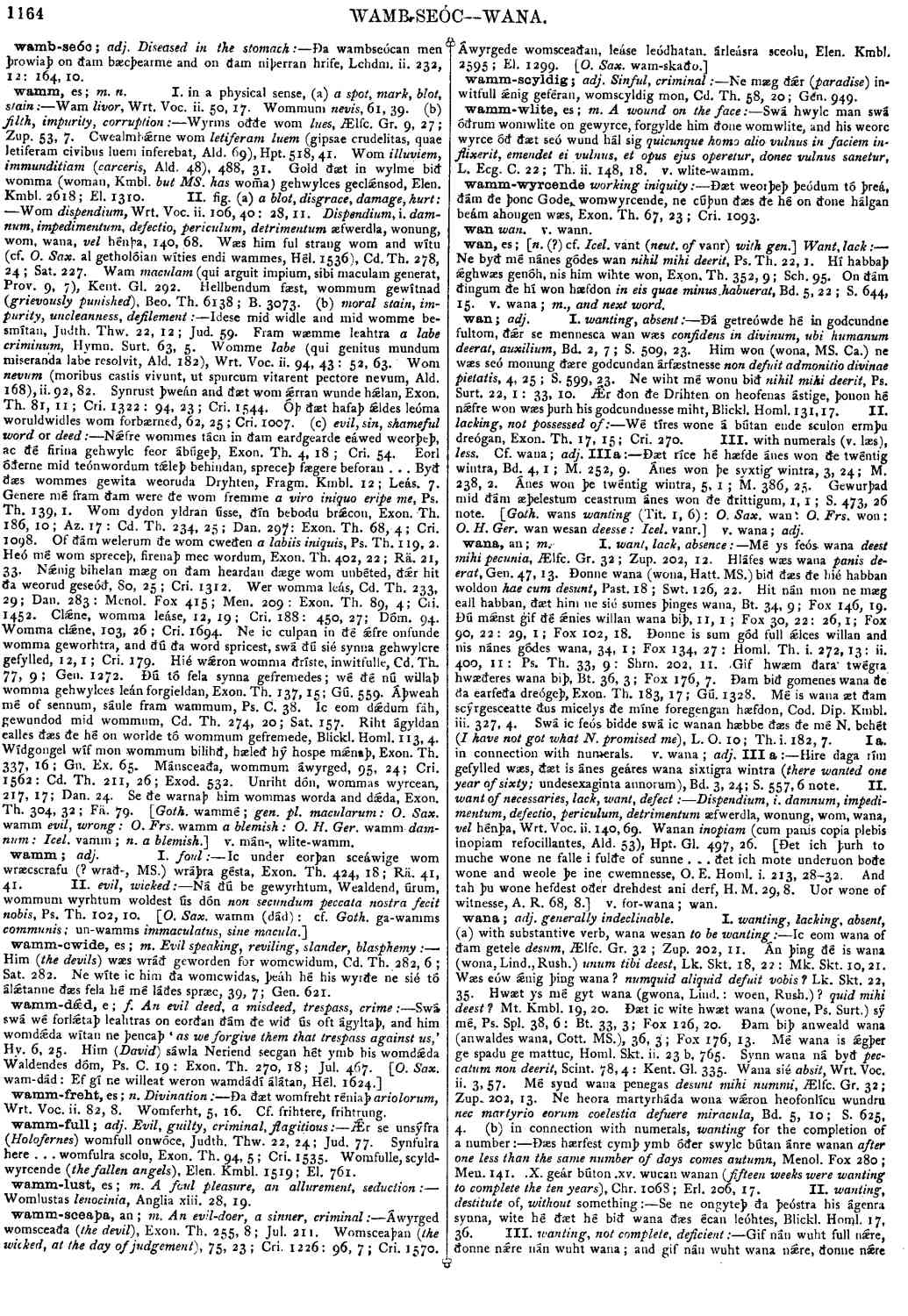wana
- noun [ masculine ]
- adjective
-
Ic eom wana of ðam getele desum, Ælfc. Gr. 32 ; Zup. 202, II. Án þing ðé is wana (wona, Lind., Rush.)
unum tibi deest,
- Lk. Skt. 18, 22 : Mk. Skt. 10, 21.
-
Wæs eów ǽnig þing wana?
numquid aliquid defuit vobisf
- Lk. Skt. 22, 35.
-
Hwæt ys mé gyt wana (gwona, Lind. : woen, Rush.) ?
quid mihi deest?
- Mt. Kmbl. 19, 20.
-
Ðæt ic wite hwæt wana (wone,
- Ps. Surt.) sý mé, Ps. Spl. 38, 6 : Bt. 33, 3; Fox 126, 20.
-
Ðam biþ anweald wana (anwaldes wana,
- Cott. MS. ), 36, 3; Fox 176, 13.
-
Mé wana is ǽgþer ge spadu ge mattuc,
- Homl. Skt. ii. 23 b, 765.
-
Synn wana ná byð
pec*-*calum non deerit,
- Scint. 78, 4 : Kent. Gl. 335.
-
Wana sié
absit,
- Wrt. Voc. ii. 3, 57.
-
Mé synd wana penegas
desunt mihi nummi,
- Ælfc. Gr. 32; Zup. 202, 13.
-
Ne heora martyrháda wona wǽron heofonlícu wundru
nec martyrio eorum coelestia defuere miracula,
- Bd. 5, 10; S. 625, 4.
-
Ðæs hærfest cymþ ymb óðer swylc bútan ánre wanan
after one less than the same number of days comes autumn,
- Menol. Fox 280 ; Men. 141.
-
X. geár búton. xv. wucan wanan
(fifteen weeks were wanting to complete the ten years),
- Chr. 1068 ; Erl. 206, 17.
-
II. wanting, destitute of, without something :-- Se ne ongyteþ ða þeóstra his ágenra synna, wite hé ðæt hé bið wana ðæs écan leóhtes, Blickl. Homl. 17, 36. III.
wanting, not complete, deficient
:-- Gif nán wuht full nǽre, ðonne nǽre nán wuht wana ; and gif nán wuht wana nǽre, ðonne nǽrenán wuht full; for ðý biþ ǽnig full þing, ðe sum biþ wana, and for ðý biþ ǽnig þing wana, ðe sum biþ full,- Bt. 34, I ; Fox 134, 20-23.
-
Genóg sweotol hit is ðæt ðæt fulle gód wæs ǽr ðam ðe ðæt wana
omnia perfecta minus integris priora esse claruerunt,
- 34, 2; Fox 136, 12.
-
III a. with numerals, wanting, save (cf.Goth. fidwór tiguns ainamma wanans, 2 Cor. II, 24). v. wana; m. Ia, wan; adj. III. As appears especially in the first of the following passages, the word and the numerals which precede and follow it as much form a compound as do the words which give the number they express in modern English :-- Hé wæs áne-wana-xxx-wintre (xxix wintra eald, col. 3),
- Chr. 972 ; Th. 1. 225, col. i.
-
Ánes wona sixlig wintra
undesexaginta annorum,
- Bd. 3, 24; S. 557, 6.
-
Gewurþad mid ðám æðelestum ceastrum anes wana ðrittigum,
- I, I ; S. 473, 26.
-
Ðæt ríce hé hæfde ánes wona .xx. wintra (án læs ðe twéntig,
- MS. B.), 4, 1; S. 563, 15.
-
Hé Norþanhymbra ðeóde ánes wana .xx. wintra fore wæs
genti Nordanhymbrorum decem et novem annis praefuit,
- 5, I; S. 614, 21.
- Kath. 67.
Bosworth, Joseph. “wana.” In An Anglo-Saxon Dictionary Online, edited by Thomas Northcote Toller, Christ Sean, and Ondřej Tichy. Prague: Faculty of Arts, Charles University, 2014. https://bosworthtoller.com/34625.
Checked: 0